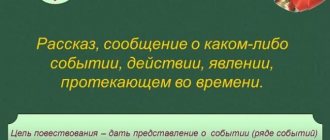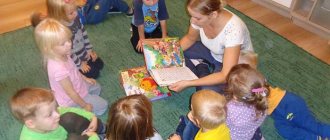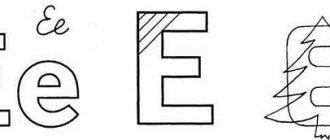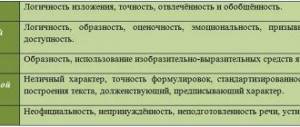Lesson summary "Harmony" in literature for grade 4
1)Divide the story into parts.Read the beginning and end of part 1 / from the words “Vanka turned his eyes to the dark window...” to the words
“It’s like it’s before the holiday
washed and rubbed with snow..."
Explain why you decided this?
Today you will work in groups. You have to agree on who will do what task. The tasks are written on pieces of paper. After consulting,
The speaker must tell the whole class about his assignment. Pay attention / loudly, expressively, correctly/. Everyone learn to listen carefully and follow the speaker’s answer. Be prepared to evaluate how the respondent spoke.
You need to construct your statement...
/help cards/
To understand the content of the story, you must complete the following tasks:
Part
I Reading “Intelligence”
- "Znayki"
Find a description of the appearance of grandfather Konstantin Makarovich.
- "Smart"
How does the author describe the night in the village?
- "Why Chicks"
From whom is the story told in this part?
Working with a dictionary
: students name incomprehensible words that caused difficulty while reading and explain.
Complete 1 task in groups:
read, agreed on assignments /students spoke in front of the class/.
When evaluating speakers, the teacher pays attention to expressiveness and correctness of the answer.
Part
II Reading “ Only the lips work”
- «Znayki"
Find and read what “Vanka’s teaching” consists of?
- «Umeyki
»
What does Vanka agree to, as long as they take him away from here?
- "Why
»
Find a sentence in the text that expresses the boy's despair?
Teacher:
- What kind of work did Vanka do in the shoemaker's house? What do you think: caring for a child, helping with housework, cleaning fish.....
- Is this real teaching? What was a nine-year-old boy supposed to learn?
- Why does Vanka want to run away from such teaching? How do you evaluate the actions of the owners towards the boy?
Conclusion
: That’s absolutely right, they violate his rights /to study, rest, to integrity/.
This was the case before the revolution.
- What rights do you have?
(slide show “Declaration of the Rights of the Child”)
Part
III Buzzing Reading
- «Znayki"
Do you think Vanka is more developed than Petka? Why?
- "Smart"
What is the reason for this?
- "Why Chicks"
What for Vanka is his “dacha”, i.e. fondest memories?
(See the appendix “Start your speech like this.”
Speaker: We were tasked with finding information and proving that Vanka was more developed than Petka.
We decided that the reason…..
Part
IV Reading in a whisper
1. “Znayki”
Do you agree with the statement that Vanka is an observant, extremely smart boy?
Prove with words from the text.
2. “Skills”
Which part of the boy's letter do you find most dramatic?
- "Why Chicks"
What does the author call the letter?
(entrusted with the most secret things, dreams, hopes).
Teacher:
Do you agree with the statement that Vanka was observant and smart?
What is Vanka's condition?
(hopelessness)
Let's return to the plan. Did we do everything in the lesson?
(on the board I clearly show with a red flag what has been done)
Let's return to the hypothesis.
- Did Chekhov manage to truthfully describe Vanka's life?
- Why does the author so accurately describe the boy’s life before the revolution?
Conclusion:
Yes, you were right. Chekhov spoke about himself like this...
(slide portrait of Chekhov, epigraph)
“I didn’t have a childhood as a child...”
- We review the work plan and evaluate its implementation.
- Have you met the author of the work?
- Have you worked on the content of the text?
Conclusion:
Did we manage to do everything we planned during the lesson?
Let's think about what was successful during the guys' performance, did it work?
Teacher:
I noticed that I need to work on my expressiveness.
Did you manage to work in groups?
Conclusion:
Today we learned to speak in front of the class.
If you wish, select the task that you would like to complete.
1. I invite you to play the role of a writer and continue the story.
2. Retell close to the text the passage that made the greatest impression on you.
3. Read “like a speaker” the passage that made the most impression on you.




